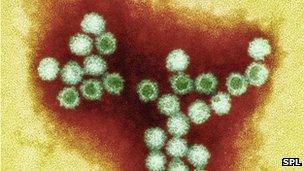Winter bug cases '83% up on 2011'
- Published

Reported cases of norovirus have increased - but scientists do not know why
Latest figures show there has been an increase in cases of norovirus - often known as the winter vomiting bug.
The Health Protection Agency estimates there have been about 880,000 cases in England and Wales since the summer, 83% more than in the same period last year.
There have been just over 3,000 lab-confirmed cases.
But the HPA says these reported cases are the tip of the iceberg and for each one, there will be around 288 that go unreported.
Health Protection Scotland has also reported a rise in cases.
Early increase
The figures also show there were 61 outbreaks of norovirus in hospitals in the fortnight up to December 16 - almost double the number in the same period last year when there were 35.
Norovirus is highly contagious and can be transmitted by contact with an infected person, contaminated surfaces or objects or through consuming contaminated food or water.
It spreads rapidly in closed environments such as hospitals, schools and care homes.
The norovirus "year" - the date from which experts start to count cases - begins in July and runs to the following June.
The increase in norovirus cases is occurring earlier than normal - but experts are unsure why this is happening.
And these figures are a small fraction of the number of confirmed cases seen during the usual peak period of January to March.
However the HPA stresses norovirus is unpredictable, and no two years are the same.
Laboratory confirmed reports represent a small proportion of the actual number of cases because most people do not see a doctor - and therefore their case is not recorded.
'Short-lived'
John Harris, an expert in norovirus at the HPA said: "The number of laboratory confirmed cases has risen again, following the drop in the number we reported last week.
"This is typical of the norovirus season where the number of laboratory reports fluctuates between October and April with the bulk of cases usually occurring between January and March.
"Norovirus is very contagious so we would urge anyone who thinks they may be unwell with norovirus to stay at home and stay away from hospitals and care homes.
"The infection is short-lived although it is very unpleasant while you are unwell.
"Most people will not need to go to see their doctor and will recover in a couple of days. It is important to take plenty of fluids to avoid dehydration."
A Department of Health spokesman said: "The NHS is well prepared for the increase in winter related health problems which are typical at this time of year.
"Our weekly published figures show the number of beds closed across the NHS due to norovirus symptoms is around 2%.
"This compares to 2.9% of beds that were closed during the peak of norovirus cases last winter."
The latest Scottish figures, published on 5 December, showed 2,016 laboratory reports so far this season - up 46% on 2011 figures.
- Published18 December 2012
- Published15 December 2012
- Published15 December 2012